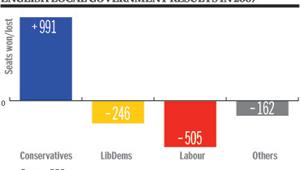It’s time to face the electoral writing on the wall. The case against first-past-the-post has already been made by recent voting trends, whatever the outcome on May 5
I am a wholly committed supporter of a change to the alternative vote system, on which Britain will decide on May 5. I even claim a measure of credit for the fact that it is up there and pitching.
It was originally one half of the solution recommended by Roy Jenkins’ Independent Commission on the Voting System, on which I sat. (The other half, top-up lists to increase proportionality, has sadly sailed down the Swanee).
So, cards on the table: I hope that the great good sense of the British people prevails in the ballot box.
But Public Finance is not a propaganda organ, not even for causes as good as this one, so I will leave others to argue today’s case for and against change. I want to take a step back, to remind people just how much the argument has shifted, particularly since the advent of the Con-Lib coalition last May.
In September 1998, when the Jenkins report was published, the arguments against had at least the virtue of consistency. To the antis, the great strength of Britain’s existing electoral system was that it gave voters the chance to throw the rascals out.
If the government did a good job, voters stuck with it. If it did a bad job, they turned against it. And because Britain’s first-past-the-post electoral system meant small changes in vote shares led to huge shifts in seats, virtue was rewarded by the retention of office and vice punished by its loss.
This, they said, made Parliament and government genuinely accountable to voters.
Plausibility was lent to this thesis for the whole of the period 1979 to 2005, when at each of seven elections one party duly emerged with a parliamentary majority. But if you toss coins you will find that from time to time you get a run of seven heads or a run of seven tails. In fact, this run of outright victories owed more to chance than to anything else.
All the time, factors were growing that meant that the next election was likely to bring a different result. The major parties’ share of the vote was trending down, the Liberal Democrat vote going up and the representatives of third, particularly nationalist, parties in Parliament, were increasing. So really the 2010 result – no majority for anyone – was only a matter of time.
It is perhaps an indication of the future. Certainly barring a collapse of, or split in, the LibDems, hung Parliaments are more likely than not. It is true that AV is likely to add slightly to that likelihood, but only slightly. Hung Parliaments, on all likely prognostication, are here to stay. And with that, the classic defence of first-past-the-post collapses.
Hoorah! Except that the honest AV supporter has to admit that one disappointment has gone along with this. We hoped coalition governments would be less tribal, more open. We hoped for honest debate and genuine democracy to replace the dictatorship of the premier and the ruling party.
And here – bar Vince Cable’s recent spat with David Cameron over immigration – coalition has proved disappointing.
Ministers seem frozen in the lights of the coalition agreement, even though that entirely lacks any constitutional status. Bad policies are stuck to because they are agreed policies.
The Opposition still does not get a word in edgeways.
If we do get AV, rigid parties might become more vulnerable to flexible parties. Politics might yet become more open as parties seek to attract supporters from outside their own ranks.
For now though, the case for first-past-the-post has collapsed. But it takes faith to be sure that AV will deliver all that it promises.
David Lipsey is a Labour peer











